|
|
|
Sort Order |
|
|
|
Items / Page
|
|
|
|
|
|
|
| Srl | Item |
| 1 |
ID:
189656
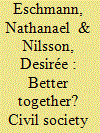

|
|
|
|
|
| Summary/Abstract |
Extensive research has been conducted in the field of peacebuilding concerning the role of civil society in peace negotiations. However, although research has stressed the importance of coordination among civil society groups, we have limited knowledge concerning the impact civil society coordination can have on the content of a peace agreement. This article addresses this gap by examining how the extent of coordination among civil society groups during peace negotiations influences the reflectiveness of a peace agreement in regard to civil society viewpoints. We argue that a high extent of coordination, where civil society actors coordinate tasks and spearhead viewpoints together, can help facilitate peace agreements that are more reflective of civil society group views. Based on a comparative analysis of Guatemala and El Salvador, the findings show that whereas coordination between different civil society groups was quite extensive in both peace processes, civil society viewpoints were inscribed into the peace agreement to a larger extent in the Guatemalan case. We identify two factors that contribute in shaping how coordination influences the content of peace accords: symmetrical transfer of information, and openness from the negotiation parties to consider suggestions from civil society.
|
|
|
|
|
|
|
|
|
|
|
|
|
|
|
|
| 2 |
ID:
192018
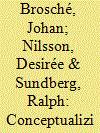

|
|
|
|
|
| Summary/Abstract |
Civil wars that appear to observers to be the most complex—even using a colloquial understanding of the concept—are also those that seem to register the most intense fighting, the most prolonged spells of war, and the most resistance to durable conflict resolution. But what does it really mean for a civil war to be complex? We currently lack a concept of “civil war complexity” that can help us better understand the most important variations in civil wars across time and space. To address this gap we develop a conceptualization of “civil war complexity” consisting of three dimensions—“actor complexity,” “behavior complexity,” and “issue complexity”—and demonstrate how they manifest empirically. We also highlight this conceptualization’s utility—and the danger of overlooking it—through the case of Darfur. This conceptualization paves the way for a new research agenda that explores how civil wars differ in terms of their complexity, the causes and consequences of civil war complexity, and how to refine conflict resolution techniques and strategies.
|
|
|
|
|
|
|
|
|
|
|
|
|
|
|
|
| 3 |
ID:
172316
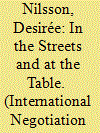

|
|
|
|
|
| Summary/Abstract |
When bringing armed conflicts to a peaceful end, the inclusion of civil society in peacemaking is a vital task. However, whereas previous research on civil society inclusion has made significant advancements, surprisingly little attention has been paid to analyzing how civil resistance and mass action may interact with more elite-driven approaches during peace processes. This study addresses this research gap by examining the interplay between elite and mass-based civil society approaches in three different peace processes in civil wars in Africa in the post-Cold War period: Liberia, the Central African Republic (CAR), and Burundi. We advance the literature by developing a framework that focuses on coordination of these different efforts and we explore this interplay empirically. With this study, we aim to broaden the research agenda, allowing for future synergies at the research frontier of mass action and the inclusion of civil society in peace processes.
|
|
|
|
|
|
|
|
|
|
|
|
|
|
|
|
| 4 |
ID:
083246
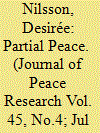

|
|
|
|
|
| Publication |
2008.
|
| Summary/Abstract |
Previous research proposes that peace is more likely to become durable if all rebel groups are included in the settlement reached. The argument implies that if actors are excluded and continue to pursue the military course, this could have a destabilizing effect on the actors that have signed an agreement. This article argues that all-inclusive peace deals - signed by the government and all rebel groups - are not the panacea for peace that many seem to believe. Given that the parties are strategic actors who are forward-looking when making their decisions, the signatories should anticipate that the excluded parties may continue to fight. Therefore, the risk of violent challenges from outside actors is likely to already be factored into the decisionmaking calculus when the signatories decide to reach a deal, and so does not affect their commitment to peace. Implications from this theoretical argument are tested using unique data on the conflict behavior of the government and each of the rebel groups in internal armed conflicts during the post-Cold War period. The results are well in line with the theoretical expectations and show that whether an agreement leaves out some actor does not affect whether the signatories stick to peace. The results demonstrate that, even when excluded rebel groups engage in conflict, this does not affect the signatories' commitment to peace. Hence, the findings suggest that partial peace is possible.
|
|
|
|
|
|
|
|
|
|
|
|
|
|
|
|
| 5 |
ID:
185242
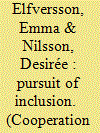

|
|
|
|
|
| Summary/Abstract |
Why are some peace processes in communal conflicts more inclusive of civil society actors than others? Inclusion of civil society actors, such as churches and religious leaders, women’s organizations, or youth groups, is seen as important for normative reasons, and studies also suggest that civil society inclusion can improve the prospects for durable peace. Yet, we have a very limited understanding of why we observe inclusion in some communal conflicts but not others. We address this gap by theorizing about various forms of civil society inclusion in local peace processes, and examining to what extent involvement by different types of third-party actors—governments, inter-governmental organizations (IGOs), and non-governmental organizations (NGOs)—may contribute to inclusion. Empirically, we draw on a combination of cross-case and in-depth data covering peace negotiations in communal conflicts in Kenya. The findings show that civil society was less frequently included as facilitators when the government was involved as a third party, while inclusion in the form of direct participation of civil society in negotiations, or via involvement in the implementation phase, was equally common across different types of third-party actors. Our study thus provides important new insights regarding how inclusion plays out in communal conflicts.
|
|
|
|
|
|
|
|
|
|
|
|
|
|
|
|
| 6 |
ID:
190020
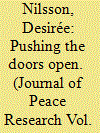

|
|
|
|
|
| Summary/Abstract |
Whereas previous research shows that peace agreements which include a broad segment of society are more likely to lead to sustainable peace, little effort has gone into explaining inclusion itself. We address this gap in the literature by providing the first large-N study to examine the causes of inclusive peace negotiations across civil wars. We argue that civil society actors can gain leverage through mobilization of civilian protest, or build trust through dialogue efforts, thereby enhancing the chances of inclusion of non-warring actors at the negotiation table. The argument is examined by analysing unique and new monthly data on peacemaking efforts in all intrastate armed conflicts in Africa and the Americas, 1989–2018, including measures beyond mere nominal participation, such as whether civil society actors or political parties had substantive roles as either mediators or full participants at the peace talks. Our findings show that protests by civil society actors increase the likelihood that non-warring actors will have a seat at the negotiation table, whereas we find no such effect concerning dialogue efforts. The article contributes by providing new insights into how nonviolent action can shape peace processes by opening the doors to negotiations and is thus part of an emerging research agenda that seeks to bring together the fields of civil resistance and inclusive peace processes.
|
|
|
|
|
|
|
|
|
|
|
|
|
|
|
|
| 7 |
ID:
161547
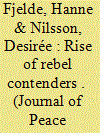

|
|
|
|
|
| Summary/Abstract |
Fragmentation of armed opposition movements through the rise of new rebel groups constitutes a significant challenge to conflict termination and peacebuilding. Yet, the question of why some rebel movements remain cohesive whereas others see a number of contending groups during the course of the armed conflict has received limited attention in existing research. This article addresses this gap by analyzing the determinants of the rise of rebel contenders in intrastate armed conflicts worldwide, 1975–2013. The theoretical framework focuses on barriers to entry, that is, variations in the costs and disadvantages that must be borne by nascent rebel contenders that are not borne to the same extent by incumbent rebel groups. The study proposes that strong social networks underpinning incumbent groups create structural barriers to entry for nascent groups by aggravating challenges of organization building. It further suggests that the interaction between incumbent groups and the government influences strategic barriers to entry as changes in government policies produce windows of opportunity for nascent groups to form. Consistent with these arguments, the study finds that when incumbent groups have strong networks – because rebels either tap into ethnic networks or draw on a leftist ideology – the risk of fragmentation is lower. Furthermore, when the government accommodates groups, through either negotiations or democratic concessions, the risk of fragmentation increases.
|
|
|
|
|
|
|
|
|
|
|
|
|
|
|
|
|
|
|
|
|